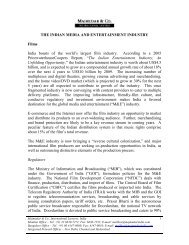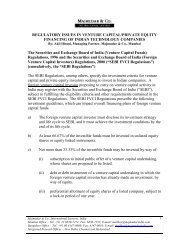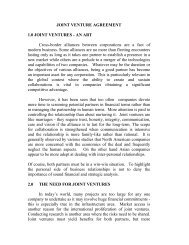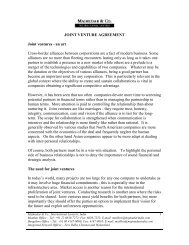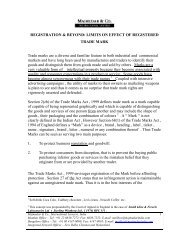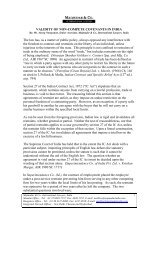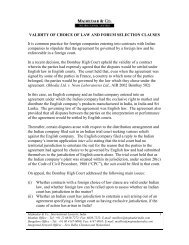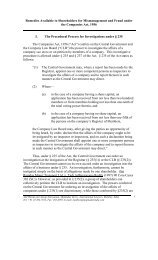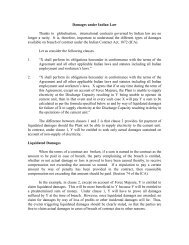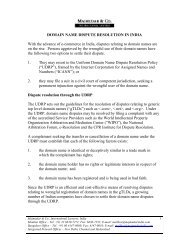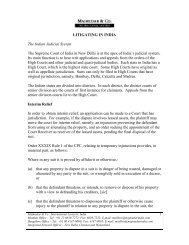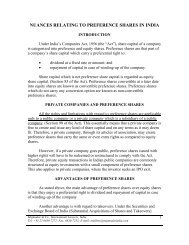Contracts of confidentiality and non-compete with ... - Majmudar & Co.
Contracts of confidentiality and non-compete with ... - Majmudar & Co.
Contracts of confidentiality and non-compete with ... - Majmudar & Co.
You also want an ePaper? Increase the reach of your titles
YUMPU automatically turns print PDFs into web optimized ePapers that Google loves.
textile technology agreed to serve the plaintiff’s spinning mills for 5 years. After<br />
serving for about a year as a Senior Assistant he resigned <strong>and</strong> accepted an<br />
employment in another spinning company on a salary higher than he was getting.<br />
The Plaintiff employed him because <strong>of</strong> his specialized training <strong>and</strong> there was<br />
considerable dearth <strong>of</strong> such trained technicians. The agreement was held valid <strong>and</strong><br />
an injunction to prevent breach <strong>of</strong> negative covenant was granted. But in another<br />
similar case, Magan Lal v. Ambica Mills ((1964) A. Guj. 215), the same court did<br />
not grant an injunction. The reason for upholding restraint against an employee is<br />
to protect the proprietary rights <strong>of</strong> the employer if it is reasonably necessary in the<br />
case <strong>of</strong> trade connections or trade secrets but it is not available if directed to<br />
prevent competition or against the use <strong>of</strong> personal skill <strong>and</strong> knowledge acquired by<br />
the employee in his employers business (Herbert Morris Ltd. v. Saxelby (1916) 1<br />
A. C. 688; (1916-17) All. E.R. 305).<br />
Thus, if the restraint is reasonable then the agreement to that effect is held to be<br />
valid. When drafting <strong>and</strong> applying the clauses pertaining to <strong>confidentiality</strong> it is<br />
essential to consider the factual circumstances relevant to the operation <strong>of</strong> the<br />
clause. If the <strong>Co</strong>urts are <strong>of</strong> the opinion that the purpose <strong>of</strong> the restraint is to inhibit<br />
the employee from leaving his employment or to prevent legitimate competition,<br />
then the clause in question will not be upheld. There is always an implied duty <strong>of</strong><br />
fidelity to the employer that would prevent an employee from using his skill for<br />
the benefit <strong>of</strong> a rival company in cases relating to confidential information. Even<br />
in the absence <strong>of</strong> an agreement or even a clause in an agreement, which restrains a<br />
person from breach <strong>of</strong> confidential information, there is an implied duty <strong>of</strong> fidelity<br />
towards the employer, which prevents breach <strong>of</strong> confidential information.<br />
The jurisprudence <strong>of</strong> <strong>confidentiality</strong> is still in its infancy in India <strong>and</strong> therefore a<br />
resort to the English law <strong>and</strong> decisions <strong>of</strong> various courts on this point will be<br />
useful in underst<strong>and</strong>ing the concept <strong>of</strong> <strong>confidentiality</strong> contracts.<br />
<strong>Majmudar</strong> & <strong>Co</strong>., International Lawyers, India 6<br />
Mumbai Office – Tel: +91 22 6630-7272; Fax: 6630-7252; E-mail: mailbox@majmudarindia.com<br />
Bangalore Office – Tel: +91 80 4147-0000; Fax: 4147-0010; E-mail: mailbox@majmudarindia.com<br />
Integrated Network Offices – New Delhi, Chennai <strong>and</strong> Hyderabad



